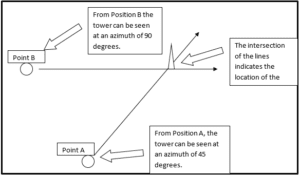In military map reading an “Intersection” is the location of an unknown or inaccessible point that is determined by “shooting an azimuth” from two or more known locations.
I hope I haven’t lost you. Just imagine yourself in a forest or field. In the distance you see a large radio tower. Using a compass you determine the tower is at an azimuth (a direction measured in degrees—0 to 360) of 45 degrees from your position. Then, on your military map you draw a straight line 45 degrees from your position.
But that’s not enough. The line on your map runs over several radio towers. How can you tell which one is yours? It requires someone from at least one other known location to shoot an azimuth toward the radio tower. The other person, to your north, uses his compass to determine the radio tower is 90 degrees from his position. Your position is Point A on the map. His is Point B on the map. You draw a line 45 degrees from your position. From his position you draw a 90 degree line. Where your lines intersect—that’s where the radio tower is.
 Seeing an object from just one position is not enough to determine its distance from you and its location. Viewing it from at least two positions is necessary. Three is better.
Seeing an object from just one position is not enough to determine its distance from you and its location. Viewing it from at least two positions is necessary. Three is better.
This procedure in map reading also finds an application in understanding the issues of life. For it takes more than one point of view to determine reality and to understand the many facets of an issue. Let me explain.
I recall a young married Soldier I tried to help years ago. An argument with his wife had escalated into shoving and punching. An officer in my unit made the comment about their childish behavior: “Can you believe that their last fight with each other was over a box of crackers? I can’t understand how anyone could be so childish.”
I know. Fighting is “always inexcusable.” But I wondered. If that officer had known the sting of poverty, would he have been more understanding? Would he have suspected that the “box of crackers” was the last bit of food in the house? What if he had tried to support a family entirely on a PFC’s income? I suspect he would have been less judgmental.
The officer in charge would not only have looked at the situation from the point of an officer trying to uphold high standards. He would have also known how the stress of living from paycheck to paycheck could create conflict in the home. The two views would give him a better understanding of “where the Soldier was at” in his trouble—like the lines of two azimuths intersecting.
Proverbs 11:14 tells us that, “For lack of guidance a nation falls, but many advisors make victory sure.” I doubt that King Solomon was referring to “many advisors all advising the same thing.” Rather, it is when advisors look at a problem from different perspectives that they can begin to understand and resolve it.
PRAYER:
Dear Father in heaven, open my mind and my heart to understand others and the troubles they have. Help me to look at other people and life itself through Your eyes. Amen.






